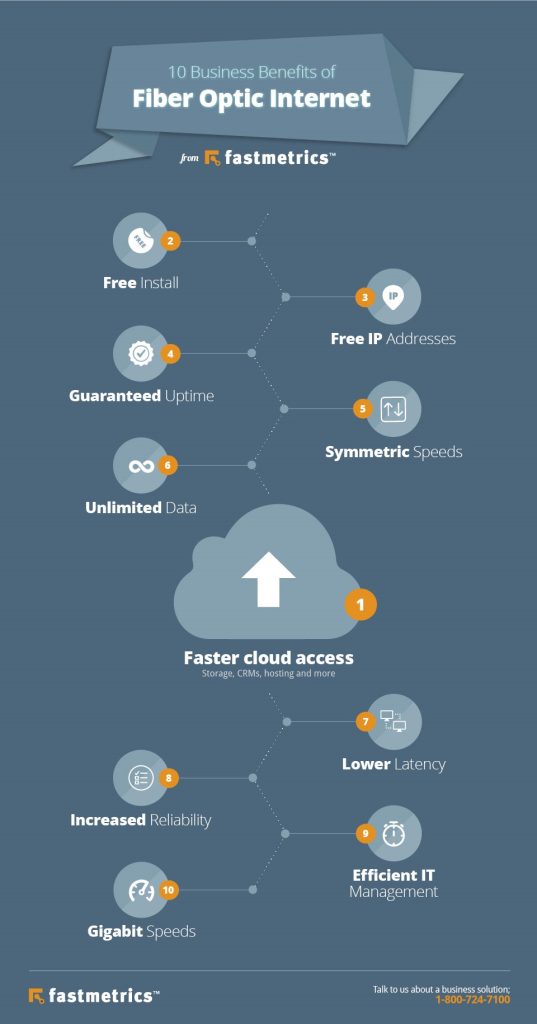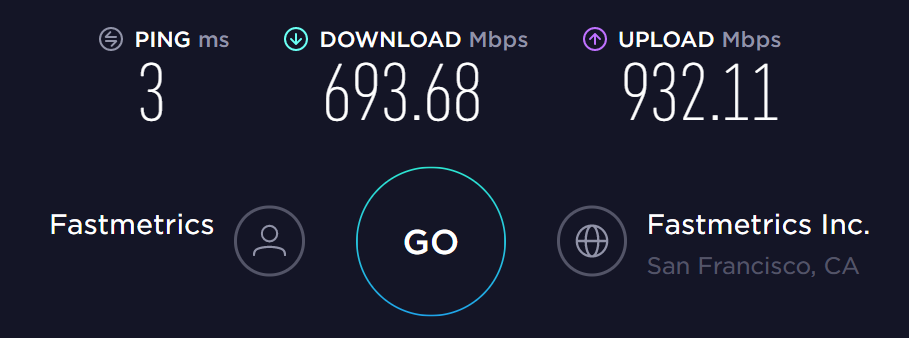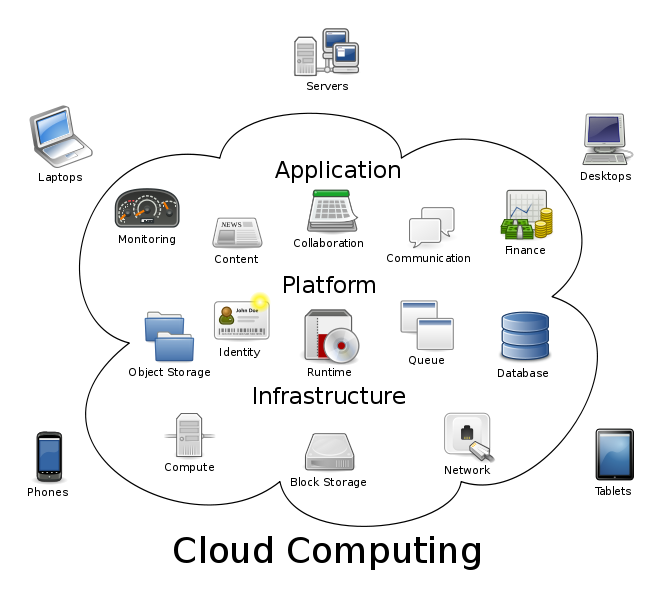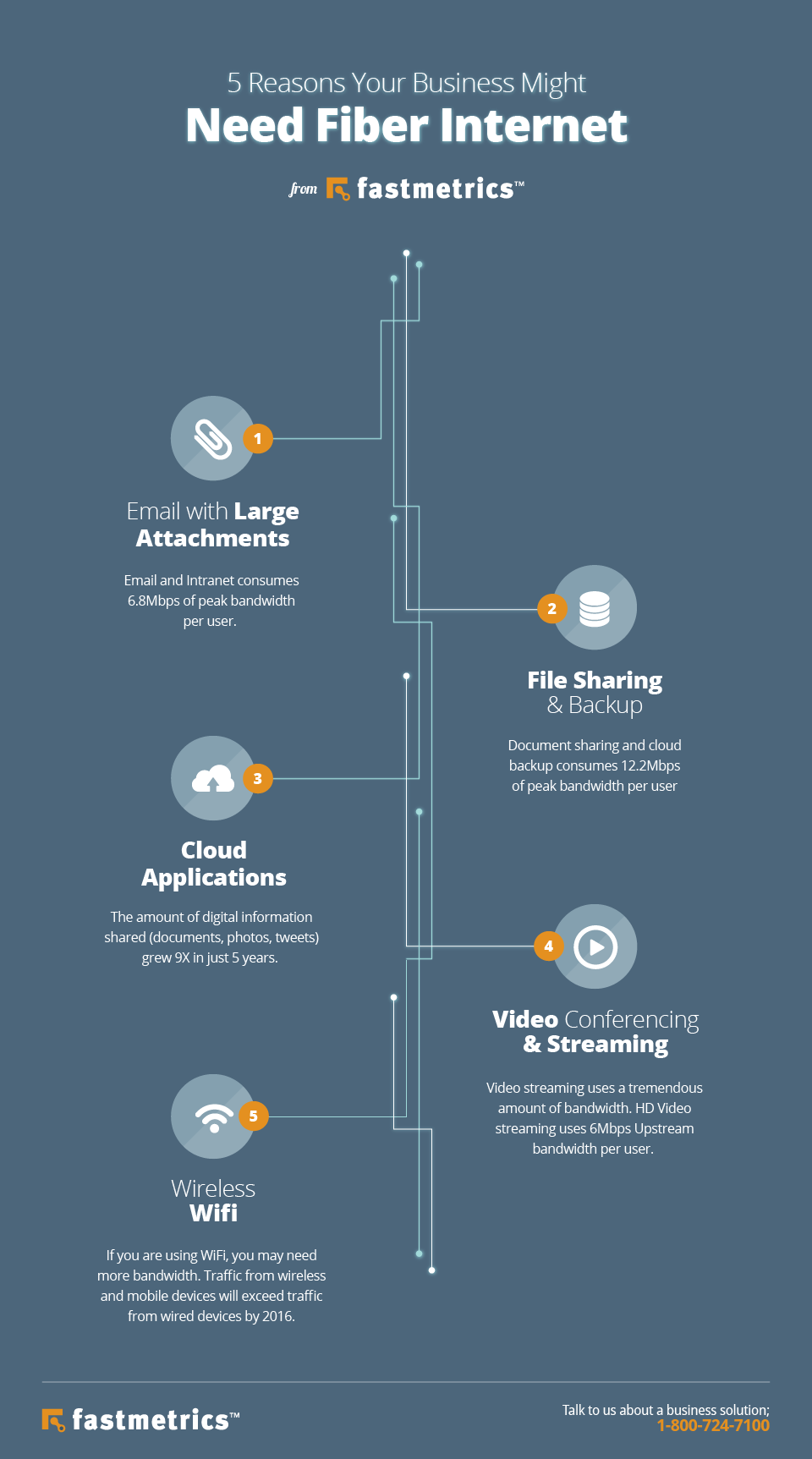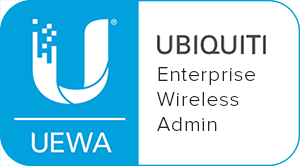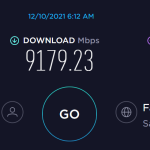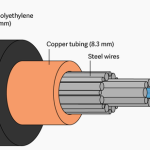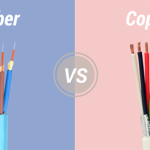Benefits Of Fiber Optic Internet Service & Reasons For Fiber Bandwidth
There are definitely many more than 10 benefits of fiber optic internet service. Below are 10 of the key advantages. Our infographic below aims to highlight what fiber internet service can achieve. Additionally, we hope to provide info on whether fiber is a suitable option for your business. (Especially important if you are weighing up choosing between fiber and broadband internet options).
Cons Of Fiber Optic Internet Service
We believe that the positives of fiber far outweigh the negatives, but some cons of fiber optic internet service for businesses include;
- Higher monthly service cost
- Longer install time
- Availability of fiber in certain areas and buildings
Full disclosure: yes, we provide fiber service. Yes, we still get asked why it costs more than other business internet connections, so we have tried to explain that further as well. Fiber will not suit everyone, that’s for sure. It depends on what your business requirements are.
Does Your Business Need Fiber Optic Internet Service?
Quite simply, if you have 10 or more employees who need to access cloud based services such as SugarCRM, dropbox, Google Drive, or a cloud based PBX service (to name just a few), DSL or a shared cable line, will likely not meet your business needs. The emergence of cloud computing services and technologies such as SaaS, Paas and IaaS have changed how companies and enterprises do business. The need for instant data / information, along with heightened bandwidth, also highlights some disadvantages of cloud computing. To meet higher demands and more bandwidth across the board, internet providers are aggressively upgrading infrastructure.
Slow internet speeds, high latency and ‘maxed out’ connections, can be the cause of losses in business productivity and efficiency. Fiber internet service aims to ensure higher connection speeds for multiple users, (generally more than 10). To compete in the fiber market, (especially now that Google Fiber has rolled out to more residential locations), the good news is that fiber service pricing is now more accessible for residents and businesses alike.
Infographic: 10 Fiber Optic Internet Service Benefits
- Faster cloud access: As mentioned above, fiber delivers on this front. Whether you are supporting multiple team members with CRM access, or hosting, storing or connecting to the cloud, fiber allows high speed access.
- Free installation: We offer a free installation of fiber on a 3 year term. This term offsets the costs involved, such as obtaining permits to dig fiber trenches, construction and the ‘pull’ of fiber into your building. Yes, in some instances, fiber can take a long time to be activated.
- Free IP addresses: Fastmetrics offers a block of 64 IP addresses with every fiber connection. If more are required, this can be easily requested.
- Guaranteed up time: Up time of fiber is guaranteed and backed by a Service Level Agreement. The use of glass instead of copper based technology makes fiber optic internet less prone to outages and down time.
- Symmetric speeds: Fiber upload and download speeds are faster. Many fiber connections offer symmetric up and down speeds. With broadband and cable, often only download speeds are high or advertised.
- Unlimited data: We hate the thought of putting limits on use of our internet services, so no data caps are in place for any internet connections that we provide.
- Lower latency: Another key benefit of fiber. Lower latency means packets are sent faster over your network.
- Increased reliability: Fiber is less prone to downtime like copper based services. It provides consistent and complete coverage, which can be a downfall of wireless service.
- Efficient IT management: Fiber allows other services to be converged. Business IT services such as phones, hosting and data backups can ‘ride’ on a single fiber connection. This is opposed to say, running separate DSL lines for VoIP or faxing.
- Gigabit speeds: Fiber can be scaled up to 1 Gbps symmetric or even 10 Gbps. Not everyone requires this level of speed, but it is nice to know that as your business grows, you have the means to support the needs and demands of your users.
Fiber Optic vs. Broadband Internet Services
As a society, we are always connected. We expect more from our internet services. Whether that be from nearby cable or fiber optic internet providers, or a local broadband ISP. Today, fast and reliable connectivity is no longer a luxury, it is a must. These service expectations increase exponentially in the workplace. When internet service is fast and reliable, employees are productive, clients are happy and business grows.
When the opposite is true, your business can really suffer. Conference calls and videos are choppy; data storage and protection is slow, or worse – compromised. Employees can be become frustrated and less productive, which effects your bottom line. There’s no doubt that internet connectivity plays a significant role in business operations. When paired with the availability of multiple service providers and access options, selecting the right internet for your business or company can be a difficult choice.
This is often a choice that’s frequently between fiber optic internet providers and broadband connectivity options. That decision often comes down to one simple question: which one is better for my business? The answer to the question of broadband vs fiber relies on looking at multiple factors.
5 Reasons Businesses Use Fiber Optic Internet vs. Broadband (One Reason They Don’t)
1. Improved Internet Service Reliability
For most, reliability is a leading factor when deciding what type of internet service to choose. Broadband and fiber optic both represent two of the most reliable connection types available to consumers and businesses today. However, although broadband is often reliable, when compared to alternative options such as fiber, it’s also the service most likely to face interruptions from a host of environmental and location factors. By design, fiber optic Internet is a dedicated, passive system, meaning it is far less likely to be the effected by service interruptions. The dependable nature of our fiber optic internet solution, metricFIBER, carries a 99.99% service up time Service Level Agreement. This consistently makes fiber optic ISPs an attractive choice for businesses in the San Francisco Bay Area and Los Angeles, thankfully, now a days it is easier to find a business internet service provider that offers this option.
2. Bandwidth Considerations
Bandwidth, or the lack thereof, can have a huge impact on business operations at crucial times. Web conferences, video streaming, online presentations, supporting an IP based phone system or hosted IP PBX, file sharing, and cloud applications, can be challenging when upload and download speeds are stunted due to high demands on bandwidth.
Broadband, such as DSL or cable internet connections are typically shared across different customers. Because of this, bandwidth, though sufficient at certain times, can be compromised during peak time or during heavy usage. Even for businesses with minimal broadband neighbors, periods of high data transmission internally can have the same effect. Fiber internet providers, on the other hand, operate as a dedicated service being used only by the business for which it’s established, negating much of that concern. Fiber certainly is designed to deliver an internet service with upload and download speeds that are as quick as they are reliable.
3. Cloud Access Requirements
Today, cloud computing services and platforms such as cloud storage have become a major tool for businesses across the globe. Delays when accessing or uploading information to ‘the cloud’ can be problematic. Especially for businesses that work with clients or potential customers in real time (i.e., customer service, call centers, etc.) or those that rely on a global workforce.
Because of the two aforementioned benefits of fiber optics, cloud access and data storage, becomes another factor in the decision between broadband and fiber optics. Similarly, broadband, specifically its proclivity for delays and service interruptions, can make it a poor choose for significant cloud reliance. As such, for customers in the Bay Area who rely heavily on cloud storage would benefit from fiber internet.
4. Security Factors
Another concern that is increasingly important in our progressing cyber age – is security. Breaches happen so frequently we sometimes mistake it for normalcy. To combat that, many companies are searching for the best way to fortify their networks and data, from client records to valuable intellectual property. Of the two internet services discussed, a network using broadband is more vulnerable to malicious attacks. Infiltrating a network using broadband services can be easier than gaining access to a network employing a faster fiber optic internet service. For that reason, businesses or enterprises that are looking to increase the speed and reliability of their internet service, as well as fortify data stored online, may find a welcome solution in fiber optic providers.
5. Fiber Internet vs Broadband Pricing
Price and availability are often the two governing factors in any decision between choosing fiber network providers versus broadband. If your company is located in the Bay Area, we’ve got you covered either way. Though most information points to fiber optic internet providers as the clear winner in a battle of internet services, broadband is often the more affordable option. Your business budget for services must come into consideration, first and foremost.
Broadband vs Fiber Verdict: Choose a Fiber Optic ISP
Fiber optic connections are typically more expensive, for various reasons. However, we’ve been working in the Bay Area to make fiber optic more accessible and affordable. Today, as part of our fiberIVY network, we have more than 70 commercial buildings across the Bay Area ready with existing fiber optic infrastructure, for business use. For businesses in or thinking about moving to one of those buildings, fiber optic internet may be more affordable than you think – plans start as low as $300 a month.
Additionally, price is dynamic depending on speed requirements. With business productivity, customer satisfaction, and data security all factoring into the true price of internet service – a more reliable, quicker, and secure service, will lead to a stronger bottom line. In those terms, we truly think fiber optics can be a cost saving service for companies that need it. There you have it. Broadband and fiber optic internet providers can both supply users access to the internet. While broadband may be a more affordable and feasible option that gets the job done in the short term, for lower bandwidth demands, fiber optics can take things to the next level. If your business needs secure and reliable access to the internet with unparalleled upload and download speeds, regular access to the cloud, fiber just may be the right choice for your business.
Fiber Internet – A Smart Solution For Today’s Internet Users
There has been an explosion in fiber internet service demand, for both businesses and residential users. This can be attributed to both awareness of fiber technology and the way the internet is used as a utility today, has evolved. Worldwide, more and more people are needing faster internet service with increased bandwidth, to meet requirements. Users want to do a wider variety of things on the Internet, more often.
- Fact 1: Global internet traffic has exploded. Cisco predicts in it’s Visual Networking Index White Paper, that today’s IP traffic will increase threefold over the next 5 years.
- Fact 2: Internet speeds of 2 or more years ago, are no longer acceptable for today’s increasing demands.
How Fiber Internet Bandwidth Can Benefit Business
Reasons Businesses Need More Bandwidth
- Email with large attachments: Email with large attachments and company intranets on average consume 6.8 Mbps of peak bandwidth.
- File sharing with cloud backups: According to Gartner research, 12.2 Mbps of peak bandwidth is required per user, for simple file sharing and cloud backups.
- Supporting cloud applications: The amount of digital information being shared today, grew by 9 times in the last 5 years. This includes info such as documents, photos and even Tweets!
- Video conferencing and streaming: Video streaming uses a huge amount of bandwidth. On average, HD video streaming uses 6 Mbps upstream bandwidth per user.
- Wireless WiFi connections: If you also supply a business WiFi service to your employees or guests, higher bandwidth is likely to be required. This year, IP traffic from wireless and mobile devices will exceed traffic from ‘wired’ devices.
Basically, fiber internet service suits businesses or residents with heavy bandwidth needs; frequent file sharing or cloud demands, high upload / download or streaming requirements.
Is Your Current Business Internet Service Improving Or Hindering Productivity?
A simple internet speed test can reveal some interesting things about your current internet connection. Upload and download speeds and latency times matter more than ever, today. Now think about the time your workforce or team spends waiting for uploads, downloads, files or applications to load. This ‘micro’ downtime is inefficient and can be a drain on business productivity. It’s possible your internet service is already slowing down or ‘maxing out’, (especially during peak times), due to a lack of bandwidth. See some reasons for slow internet here.
What Fiber Internet Speeds Are Available?
For business use within commercial buildings or offices only, the Fastmetrics fiber internet service called metricFIBER, is available throughout the entire San Francisco Bay Area and L.A. This service delivers speeds up to to 10 Gbps symmetric. For residential users, Google Fiber has brought fiber to various parts of the USA. Expansion plans are currently on hold, but there are quite a few existing fiber-lit cities. Google’s plans for residents offer Gigabit speeds and TV service and are very cost effective.
How Does Bonded Copper Based Internet Speed Compare
Gigabit internet speeds are simply not possible over copper based infrastructure. Nor are higher speed business broadband connections, cost effective. Consider the cost of a T1 line or even a bonded T1, can cost $200 per month or more. A T1 line also provides a slow 1.5 Mbps, (or 1.5 Mbps upload and download when bonded).
About Fastmetrics, Inc. Building & Business ISP
Since 2002, Fastmetrics is the Bay Area’s only dedicated business ISP. We provide telecommunication services in California and the San Francisco Bay Area. Reliable service – backed by better live and local support. From install to 24-7 proactive monitoring, get treated like a VIP customer. Not a number by a faceless call center. We specialize in managed business internet and phones, dedicated high speed business fiber internet, business WiFi, SIP voice solutions / UCaaS and managed network services. We are a Microsoft and Cisco Meraki Partner. Our team are Certified Cisco Specialists, Ubiquiti Enterprise Wireless Accredited and Polycom Authorized Solution Advisors. We take care of your business network, so you can focus on growth.


